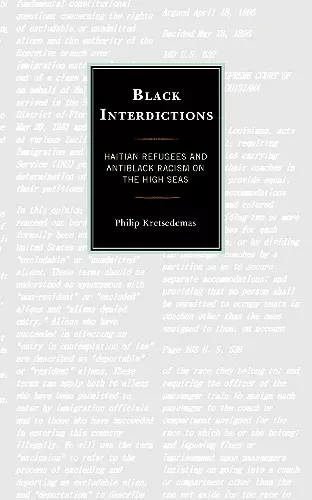Black Interdictions
Haitian Refugees and Antiblack Racism on the High Seas
Format:Hardback
Publisher:Lexington Books
Published:1st Mar '22
Currently unavailable, and unfortunately no date known when it will be back
This hardback is available in another edition too:
- Paperback£35.00(9781793630742)

Haiti is the first, and only, modern nation-state to be created as the result of a successful slave revolution. However, since its emancipation, the Haitian state has been forced to pay Western states compensation for the loss of the enslaved people, contended with a chronically unstable and authoritarian state system, and has been ranked as the poorest economy in the Western hemisphere. Black Interdictions exposes the antiblack racism latent in the US government's Haitian refugee policies of the 1980s and 1990s that set the tone for the criminalization of migrants and refugees in the new millennium and lead to the migration and refugee policies of the Trump era. Within this experience of controlled mobility many Haitians find themselves in a devastating catch-22, unable to survive in their home nation and unable to find a better way of life elsewhere due to border enforcement strategies, strict immigration policies, and unprecedented measures to prevent asylum claims. This type of radical exclusion is singular to the black experience and the black/nonblack binary must be factored into an analysis of the US migration regime. It shows how techniques of control applied to black populations, whether free or slave, migrant, or native-born, have been precursors for policies and practices applied to nonblack migrants and refugees. It is not possible to work together for equity and justice if we are not prepared to grapple with this divisive history and the instinct to avoid dealing with the singularity of the black experience participates in the orders of knowledge and power that have been fostered by antiblack racism. This book will be of interest to scholars of migration and refugee studies, black studies, legal studies, public policy and international relations, and many others.
Starting with U.S. interdiction of Haitian asylum seekers in the 1980s, Kretsedemas reaches into the past and stretches into the future to produce a paradigm-shifting vision of U.S. immigration policy. Black Interdictions retells a familiar history by exposing the ghosts and silences in legal texts, building a profound case for metanarratives of antiblackness that undergird and pervade the law. Kretsedemas’s meticulous analysis, in turn, shatters the silences endemic to migration and refugee studies, exposing the continuities of exclusion from law and humanity of black citizens and noncitizens alike.
-- Sofya Aptekar, City University of New York School of Labor and Urban StudiesBlack Interdictions’ study of U.S. policy towards Haitian refugees updates the black studies maxim that the Haitian Revolution changed the course of the modern era. In the process, Kretsedemas has given us the most useful scholarly demonstration to date of how to grasp the “violent transits” of slavery long after the formal institution’s demise. Black Interdictions yokes multiple disciplinary fields of inquiry that have previously sought little interlocution among themselves—and, at the same time, it raises the bar remarkably for migration studies, the sociology of law, and black studies. Kretsedemas interdicts each of these respective fields for, in turn, slighting the “explanatory value of blackness,” neglecting the theoretical intervention that black “fugitive lines of flight” have historically posed to the extra-territorial and extra-judicial space of the high seas, and a scopic underdevelopment in deploying the well-established “archetype of black liberation as self-willed mobility” to generate the invaluable insight of the “plasticity of controlled mobility.” The latter concept is generative not simply for understanding black refugees around the world, but also for ascertaining the parasitic relationship of the world created through slaveholding to the black lives that continue to distend its antiblack coordinates.
-- Tryon P. Woods, University of Massachusetts, DartmouthBlack Interdictions works at but also defines the cutting edge of critical migration studies. Combining legal history along with nuanced theoretical claims, Black Interdictions demands we think differently about race, migration, and mobility.
-- P. Khalil Saucier, Bucknell UniverISBN: 9781793630728
Dimensions: 227mm x 161mm x 32mm
Weight: 712g
358 pages